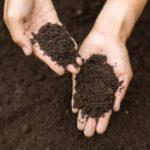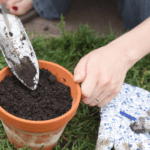Did you know that eggshells in houseplants can be a natural and beneficial fertilizer for your plants?
Have you been tossing your eggshells in the trash after making breakfast or baking? It’s time to break that habit!
While they may seem like a common kitchen waste product, eggshells offer a variety of benefits when used in houseplants and indoor gardening. From providing essential nutrients to deterring pests, eggshells can be a powerful addition to any plant parent’s tool kit.
In this article, we’ll crack open the value of this unexpected fertilizer and cover reasons you should start saving eggshells to use in your indoor garden.
Whether you have a few houseplants on a windowsill or a living room filled with botanicals, eggshells are an accessible and easy way to boost your greenery.
Key Takeaways
- Eggshells are a natural and beneficial fertilizer for houseplants.
- They provide an organic source of nutrition, particularly calcium.
- Crushed eggshells can be used as a soil supplement to give plants the calcium they need to thrive.
- Eggshells can be prepared by cleaning, drying, and crushing them into a fine powder.
- Plants that benefit from eggshells include roses, African violets, monstera, and philodendrons.
The Science Behind Eggshells as a Fertilizer

Eggshells are not just waste; they can be a valuable resource for the growth and health of your plants. Eggshells contain calcium carbonate, an essential nutrient that plants need for optimal growth and development.
Calcium deficiency in plants can lead to issues like blossom-end rot, stunted growth, and weakened overall health. By adding crushed eggshells to the soil, you can provide a slow release of calcium and other minerals, giving your plants the nutrients they need to thrive.
When eggshells are crushed, they break down slowly over time, releasing calcium into the soil. This slow release ensures that the plants receive a steady supply of nutrients, preventing any nutrient imbalances or overfertilization.
The calcium carbonate in eggshells also helps to neutralize acidic soil, making it more balanced and conducive to healthy plant growth.
Additionally, eggshells can improve soil structure by increasing its water-holding capacity, enhancing drainage, and promoting beneficial microbial activity.
Also Read: 7 Easy Homemade Fertilizers For Indoor Plants Growing In Water
How to Prepare Eggshells for Plant Use
If you’re looking to utilize eggshells as a natural fertilizer for your plants, it’s important to properly prepare them to maximize their benefits. Follow these simple steps to crush and use eggshells effectively:
- Clean the eggshells: Start by thoroughly cleaning the eggshells to remove any residual egg white or yolk. This will help prevent attracting pests and ensure the shells are ready for use.
- Dry the eggshells: Allow the cleaned eggshells to dry completely. This can be done by placing them on a baking sheet and letting them air dry for a few days. Alternatively, you can bake them in the oven at 400°F for about 10-15 minutes.
- Crush the eggshells: Once the eggshells are dry, they can be crushed into a fine powder. This can be done using a mortar and pestle, a food processor, or a coffee grinder. Aim for a consistency similar to that of sand.
Plants That Benefit from Eggshells
Eggshells can be a valuable organic plant food for a variety of plants, providing them with essential nutrients for healthy growth. Here are some plants that particularly benefit from the addition of eggshells as a DIY fertilizer:
Roses
Roses are known to be calcium-loving plants, making them ideal candidates for the use of eggshells. The calcium provided by the eggshells helps strengthen the cell walls of the plants, resulting in stronger stems, vibrant blooms, and overall healthier plants.
African Violets
African violets thrive with a consistent source of calcium, which eggshells can provide. The calcium in the eggshells helps prevent issues such as blossom-end rot and promotes robust foliage growth, resulting in beautiful and long-lasting blooms.
Monstera and Philodendrons
Monstera and Philodendrons are tropical plants that benefit from the calcium and other minerals found in eggshells. These minerals help promote efficient nutrient uptake and support overall plant health, resulting in lush and vibrant foliage.
Other Calcium-Loving Plants
Aside from roses, African violets, Monstera, and Philodendrons, other calcium-loving plants that can benefit from the use of eggshells as organic plant food include tomatoes, peppers, broccoli, and cabbage. These plants require higher levels of calcium for optimal growth and can greatly benefit from the slow release of calcium provided by the eggshells.
When using eggshells as a fertilizer, it is important to use them sparingly and monitor the plants for any signs of nutrient imbalance. Some plants may be more sensitive to high calcium levels, so it’s crucial to observe their growth and adjust the amount of eggshells accordingly.
Tips for Using Eggshells Safely
Using eggshells as a homemade plant nutrient is a great way to boost the health of your houseplants. However, it is important to follow a few tips to ensure safe and effective use.
Start with a Small Quantity

When using eggshells as a fertilizer, it is best to start with a small quantity and gradually increase as needed. This allows you to monitor how your plants respond to the added calcium and make adjustments accordingly. By starting small, you can avoid overfeeding your plants and causing nutrient imbalances.
Clean and Dry Thoroughly
Prior to using eggshells, it is crucial to clean them thoroughly to remove any remaining egg white or yolk. This prevents the shells from attracting pests or introducing pathogens to your soil.
Once clean, allow the eggshells to dry completely before crushing them into a fine powder. This ensures that the shells are free from moisture, preventing mold or bacteria growth.
Avoid Direct Application to Roots
While using eggshells as a fertilizer, it is important to avoid applying a thick layer directly to the roots of your plants. This can disrupt drainage and potentially suffocate the roots.
Instead, sprinkle the crushed eggshells sparingly onto the soil when watering your plants. This allows the calcium to slowly release into the soil, providing a steady nutrient boost without overwhelming the roots.
Alternative Uses for Eggshells in the Garden
Pest Deterrent
When crushed and placed around plants, eggshells can help repel slugs and other garden pests. The sharp edges of the crushed shells create a barrier that pests find difficult to cross, protecting your plants from damage.
This natural and organic method can be particularly useful for protecting delicate seedlings and young plants.
Seed Holder
Eggshells can also be used as seed holders for starting new plants. By cleaning and drying the eggshells, and then filling them with potting mix or seed starter, they provide a convenient and eco-friendly way to start seeds.
The eggshells act as small biodegradable pots, allowing the seeds to germinate and grow before they are transplanted into larger containers or directly into the garden. This method reduces plastic waste and provides a natural and nutrient-rich environment for seedlings to thrive.
Compost Addition
By adding crushed eggshells to your compost pile, you introduce calcium and other minerals that enrich the composting process.
As the eggshells break down, they release their nutrients into the compost, which can then be used as a natural and nutrient-rich soil amendment for your plants. This helps create a sustainable and eco-friendly garden.
Worm Composting
Eggshells can be added to worm composters to provide extra minerals for the worms, enhancing the quality of the resulting vermicompost.
Making Eggshell Tea
Eggshell tea is an excellent organic plant food that can provide a nutrient boost to your plants. It is a DIY plant fertilizer that is easy to make and can be used for both indoor and outdoor plants.
By boiling crushed eggshells in water, you can extract the beneficial nutrients from the shells and create a calcium-rich tea that can nourish your plants.
To make eggshell tea, start by cleaning and crumbing the eggshells. Ensure that all traces of egg white or yolk are removed to prevent any contamination. Once cleaned, place the crushed eggshells in a pot of water and bring it to a boil.
Let the mixture simmer for about 5-10 minutes to allow the nutrients to leach into the water. After boiling, remove the pot from heat and let the mixture cool overnight.
The next day, strain the cooled mixture to remove the eggshell remnants and pour the calcium-rich tea into a container. The resulting liquid can be used as a fertilizer by diluting it with water.
For most plants, a 1:4 ratio of eggshell tea to water works well. You can then use the diluted tea to water your plants, providing them with a natural and organic source of nutrients.
Conclusion
In conclusion, by harnessing the power of eggshells as a natural fertilizer in your houseplants, you can promote sustainable gardening practices and cultivate healthier, more vibrant plants. Embrace this eco-friendly solution and reap the rewards of using eggshells to enhance the beauty and vitality of your indoor plants.
FAQ
Are eggshells a good fertilizer for houseplants?
Yes, eggshells are a natural and beneficial fertilizer for houseplants. They provide organic nutrition, particularly calcium, which promotes plant growth and prevents deficiencies.
How do eggshells benefit plants?
Eggshells contain calcium carbonate, which is essential for plant growth. The calcium in eggshells helps prevent calcium deficiency issues like blossom-end rot and provides a slow release of calcium and other minerals when added to the soil.
How should I prepare eggshells for use as a fertilizer?
To prepare eggshells, clean them thoroughly, dry them, and crush them into a fine powder. This powder can be used as a soil supplement or boiled with water to make eggshell tea for plants.
Which plants can benefit from eggshells as a fertilizer?
Many plants can benefit from eggshells as a fertilizer, including roses, African violets, monstera, and philodendrons. However, it’s important to use eggshells sparingly and monitor for signs of nutrient imbalance.
Are there any precautions when using eggshells for plants?
Yes, it’s important to use eggshells in moderation, avoid applying a thick layer directly to the roots, and be aware of the specific requirements of each plant. Additionally, avoid using eggshells on plants that prefer acidic soil.
What are some alternative uses for eggshells in the garden?
Besides being used as a fertilizer, eggshells can act as a natural pest deterrent, seed holders for starting new plants, and can be added to compost or worm composters for additional nutrients.
How do I make ground eggshell fertilizer?
To make ground eggshell fertilizer, clean and dry the eggshells, then finely grind them using a coffee grinder or food processor. The resulting powder can be added to compost, planting holes, or sprinkled onto the soil.
How do I make eggshell tea?
To make eggshell tea, clean and crumble the eggshells, boil them in water, and let the mixture cool overnight. Strain the mixture and use the calcium-rich tea to water plants.







